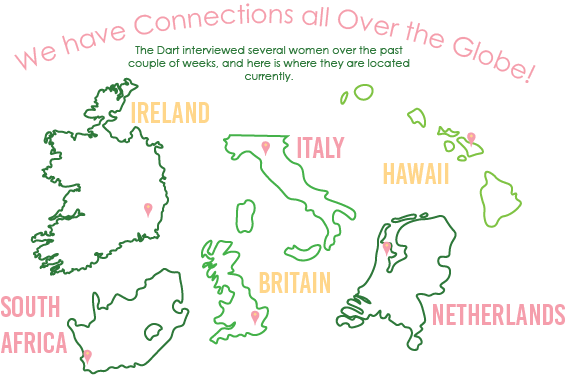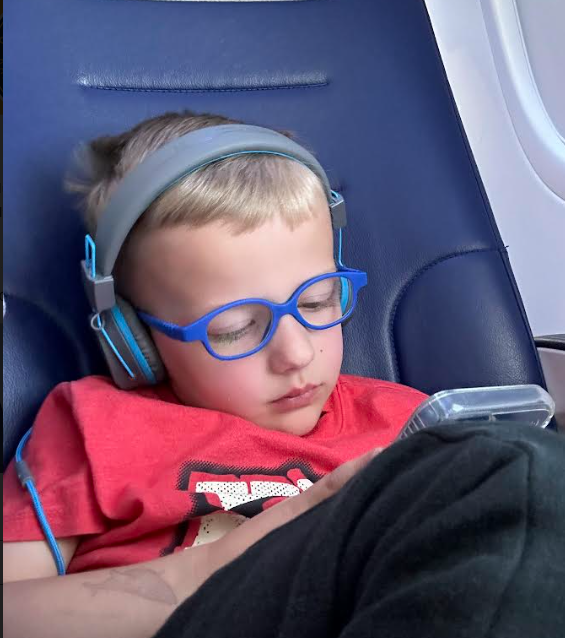Women speak Spanish, men speak English
Ms. Julia Gargallo’s family is similar to a few at STA. According to Gargallo, sitting down at the dinner table means Spanish and English fly back and forth between Gargallo, her husband and her children. Gargallo’s children, Monica, 21 and Daniel, 17, learned both Spanish and English when they were learning to talk. Today, they both still speak Spanish with their mom and sometimes with their dad Greg Woodhams.
Gargallo, who grew up in Spain, has spoken Spanish her entire life. Greg grew up in Texas, where about 4% of the total population in Texas speak English and Spanish. Although Greg’s mother’s first language was Spanish, the family never spoke Spanish at home. In addition, Greg’s great-grandfather came from Barcelona and some of Greg’s family speaks Spanish. In contrast to her father, where both sexes in his family spoke Spanish, Monica spoke different languages to the men and the women in her family.
“When my daughter was little, she thought all men spoke English and all women spoke Spanish because the men and women in [our] family spoke those languages,” Gargallo said.
Monica also attributes her language separation to her parents’ friends.
“Aside from being because my mom spoke Spanish and my dad spoke English, my mom’s friends usually spoke Spanish and my dad’s friends would usually speak English,” Monica explained in an email.
As she grew older, Monica learned that men do not necessarily just speak English and women do not necessarily just speak Spanish after seeing her mother and father speak Spanish with each other. Monica and Daniel continued to speak Spanish with their mom, helping them learn other languages, French and Japanese respectively.
Daniel, however, did not make the same distinctions that Monica made about language because he had his sister to talk to.
“The experience is completely different between the two because when Danny was born, he had Monica and Monica always spoke in English to him,” Julia explained. “The [kids] will always communicate in English.”
Speaking more than one language at home not only makes it easier to learn a third language and increase opportunities, but tolerance and a greater understanding of other cultures emerges. According to Julia, her children can better understand other cultures and are more tolerant because they do not see a right way of speaking.
Speaking Spanish in an English world
When Monica and Daniel reached school age, they both started seeing that most families only spoke one language. According to Monica though, she did not feel different.
“I don’t remember thinking that I was different from everyone else. Most of the kids I grew up with were in the same situation as me,” Monica said.
However, in school where most people only spoke English, Monica’s ability to speak Spanish interested her classmates.
“In elementary school it became a frequent topic of conversation and my classmates were fascinated and were always asking me how to say different words but by middle school it got really annoying to always give translations,” Monica said.
That fascination would carry out of school to the Woodhams/Gargallo home when friends would come over. Both Monica and Julia believe it is not respectful to speak Spanish to those who cannot understand it.
“My family and I have always made an effort to speak English around those who do not speak Spanish. When I had friends over, even if it were a conversation only between my mom and I, we would speak English out of respect,” Monica said.
Julia and Monica have no problem with speaking Spanish around those who understand it.
“In high school, however, since most of my friends had taken Spanish for a long time, they enjoyed being able to listen in Spanish and see what they understood,” Monica said.
Daniel agrees with the benefits of growing up bilingual.
“A bilingual upbringing has been to me both convenient and useful,” Daniel said. “Being brought up fluent in Spanish, I have been able to communicate with countless amazing people whom I never would have been able to meet otherwise. It’s a useful skill, which I am very proud of.”
According to the 2009 American Community Survey conducted by the United States Census Bureau, more than 35 million people in the US speak Spanish. These Spanish speakers work in all areas of life including health care, education and retail.
“[We] need to speak [Spanish] because so many people cannot speak English,” Julia explained. “It is easier for us to learn Spanish then for them to learn English.”
According to Julia, most people come to US for a better life. However, because most cannot speak English, their job options are limited, and they often work long hours. Finding time to learn English is difficult between work and family. In addition to finding time, if they lack papers, meaning they are illegal immigrants, they cannot take English classes at a community college or community center, leaving them stuck only speaking Spanish. In their countries, they might only have an elementary education.
Because of the high number of Spanish speakers in the US, many people have the opportunity to practice Spanish everyday.
Spanish speaking immigrants will continue to enter the US for jobs and a better life. Julia advocates studying Spanish to be able to communicate with those who speak Spanish.
“Spanish is close enough to English that it is not terribly difficult to understand and learn,” Julia said. “If you are going to live in the United States, you need to know Spanish.”
Like his mother, Daniel advocates the speaking of Spanish in the US.
“Some people have a foolish notion that the Spanish language is un-American, and that anybody in America who is brought up learning Spanish is being raised in an un-American way,” Daniel explained. “The problem with this ridiculous belief is that America is not a nation solely composed of Anglo-Saxons.”
Que quieres tener a lunch?
While Julia and her children speak Spanish most of the time, English is required for various words. Some words have different meanings in Spanish and English, leading to the natural combination of the two languages.
“When I talk with my Spanish friends in Kansas City,[we will speak English and Spanish],” Julia said.
For example, “lunch” in English does not mean the same thing as “almuerzo” in Spanish, so she will automatically use the word “lunch” if she is in Kansas City. In the US, “lunch” means a small meal between 11 and 1. In Spain, “almuerzo” means a large meal at 2 or 3 in the afternoon.
According to Julia, language is something that comes natural to people. Her children naturally speak English with their dad though he speaks Spanish with Julia. For Greg, it is not natural to speak Spanish with the children and he feels more comfortable speaking English.
“Even though [Greg’s] Spanish is really, really good, when the kids were little, they had to learn English,” Julia explained. “It wouldn’t make any sense for the kids not to learn English from one [parent] especially if the dad speaks English.”
Bilingual benefits continue to grow
In the United States, bilingual jobs have continued to become more and more popular. Now, many jobs such as police officers, firefighters, medical professionals, and teachers need to be able to speak Spanish.
Monica sees the benefits of being bilingual first hand, but acknowledges the work needed to get there. Monica took four years of Spanish at Barstow High School and added Spanish as a double major at Texas Christian University in Fort Worth, Texas. According to Monica, while sitting in a classroom learning colors and food may be boring, it strengthened her vocabulary to learn words her mom did not use. Four years of Spanish in high school also helped improve her ability to write well in Spanish, another reason for declaring Spanish as a double major in college.
“I say that it’s one thing to claim that you speak Spanish but it is another to say that you are able to communicate fluently both orally, through writing, and through literary analysis,” Monica explained.
According to Monica, growing up bilingually is one of the greatest skills one can have because of today’s globalization.
“I’m hoping that by the time that I graduate I will have the tools I need to not only be a competitive candidate for a job in the United States but also against native speakers in Spain, Latin America, and South America,” Monica said.
Continuing the legacy
With Spanish becoming more common in the US, the Woodhams family helps contribute to the growth.
“Everybody in the family is very open and they love Spain,” Julia explained. “They are like a little obsessed with Spain.”
One of Greg’s sisters speaks Spanish with Julia and two of Julia’s nieces are studying Spanish in college, along with Monica. Although her family has a love of Spanish, Julia is unsure if her children will continue to speak Spanish as they move on in their lives.
“My daughter maybe [will continue] to speak Spanish, but not my son,” Julia said. “When my daughter talks to the dog, she talks to it in Spanish, so maybe when she has a kid, she will talk to it in Spanish and English.”









